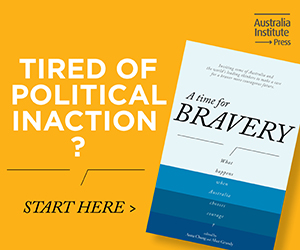In the past year or so, three Australian publishing mergers happened within a few short months. Text Publishing, Pantera Press and Affirm Press were all absorbed into a larger company. Once a company has shareholders, like Penguin Random House and Simon and Schuster (which acquired Affirm and Text), the business is geared to generate the greatest return for them.
Meanwhile, the closure of 85-year-old literary journal Meanjin has drawn the ire of industry insiders and readers in Australia and abroad.
But there’s also some good news in the launch of five new Australian book publishers: Perentie Press, Pink Shorts Press, Evercreech Editions, Aniko Press and Bakers Lane Books.
Their new work includes short books, graphic novels, short-story collections, experimental writing and literary fiction. Two are launching with prizes for unpublished work: one (worth A$2,500 as an advance towards royalties) for a graphic novel; the other a $10,000 award for an unpublished work of literary fiction by an Australian woman or gender-diverse writer, co-judged by Stella Prize winning author Emily Bitto.
Meeting the players
Three of the new ventures have set up outside of the standard duopoly for publishing: Sydney and Melbourne.
Brisbane-based Perentie Press, run by art teacher and author Bethany Loveridge and publisher Rochelle Stephens, is focusing on graphic novels – “particularly among young readers”, they told the Age.
Pink Shorts Press, founded by Margot Lloyd, former senior editor of Griffith Review and senior editor at UQP, and Emily Hart, former publisher at Hardie Grant, is in Adelaide, where the founders met working at small publisher Wakefield Press.
So far, Pink Shorts is publishing fiction: a comic take on autofiction and a satirical short-story collection by debut authors, and two cleverly packaged editions of classic novels by Adelaide author and artist Barbara Hanrahan (whose art adorns the covers), with contemporary forewords. “Australian readers are keen for books that break the mould,” they told me.
Evercreech Editions, the Hobart-based brainchild of bookseller and author Adam Ouston, has similar aims. His vision is to provide “an outlet for the out of step, the weird, the boldly defiant, a home for the homeless” – which he calls “distinctly Tasmanian”. His first project is a literary novel by former Australian diplomat Konrad Muller, described by Robert Dessaix as “a glossy black cockatoo of a book”.
In each case, these publishers are the project of industry insiders.
In Sydney, there are new entrants too: Aniko Press, which has risen from a five-year-old literary journal, is run by writer and editor Emily Riches. Its first book is a “dark, feral” short-story collection by Miriam Webster, a Wheeler Centre Hot Desk Fellow and winner of the inaugural Kill Your Darlings Nonfiction Essay Prize.
Bakers Lane Books is launching with a A$10,000 manuscript prize. Founder and publisher Ginny Grant is creating two imprints, with a focus on “new voices and women writers in all their diversity”.
Where does the money come from?
The money has to come from somewhere. Pink Shorts is running “Wordshops” to help “businesses streamline their approach to words”. They told me, “We’re used to working with authors to draw out their distinctive voices and cut unnecessary waffle, but it turns out those skills are invaluable to businesses as well (especially in the current age of endless AI [artificial intelligence] overwriting).”
Running such programs is one way to underwrite publishing books.
Initially, Pink Shorts is using the “savings” of its co-founders, but they told me, “there’s so little money in the book publishing business that some grants will inevitably be part of our future”.
Evercreech has also announced writing workshops – and its funding is coming from a “generous and silent benefactor”. Bakers Lane Press is “self funding”.
Perentie has “a little bit of seed funding”. Aniko’s funding isn’t listed on their website, but the early issues of their magazines have sold out.
There are other ways to fund operations, too: these include publishing books with primarily commercial ends to underwrite the more literary projects. Famed women-run publisher McPhee Gribble, founded 50 years ago, part-funded their publishing operations with information books for children called “Practical Puffins”.








